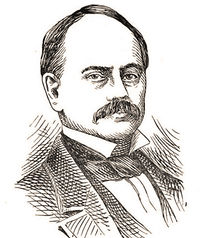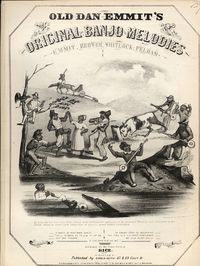Annotation:Old Dan Tucker
X:1 T:Old Dan Tucker M:2/4 L:1/8 R:Air B:Gumbo Chaff - The Complete Preceptor for the Banjo (1851, p. 7) N: A later edition of the earliest known banjo tutor, published in 1848. It was written by Elias Howe, whose pseudonym Gumbo Chaff N:is taken from Thomas Dartmouth Rice's 1834 blackface character. The 1851 edition was published in Boston by Oliver Ditson. N:In 1850 Howe sold some of his works to Ditson (this one among them) and agreed not to publish similar works for ten years. Z:AK/Fiddler's Companion K:D V:1 clef=treble name="0." [V:1] (3A/B/c/|dd (3ddd|dddA|dd df|AA BA|dd(3ddd| dd dA|dd df|AABA||f f/f/ f2|edBd|e e/e/ e2 | AABA|f f/f/ f2|edBd|ed/e/ fe|d2||
OLD DAN TUCKER. AKA and see "Soap-Fat Man (The)." Old-Time, Breakdown. USA; known in nearly every state, coast-to-coast. D Major (Mattson & Walz, Thede): G Major (Bayard, Ford, Ruth): C Major (Bayard, Buarchenal). Standard or AEf#c# (Thede) tunings (fiddle). AB (Burchenal, Ruth): AABB (Bayard, Ford, Thede). Bayard (1981) states that the origins of the tune are unclear, but that the tune predates its mid-19th century American minstrel lyrics, which have been variously credited to Dan Emmett (1815–1904), Henry Russell, and {in a version called "Gwine To De Mill"} to J.R. Jenkins. It is said that Emmett first performed his song "Old Dan Tucker" at the age of fifteen during a Fourth of July celebration on the village green in his hometown of Mount Vernon, Ohio. Nathan, in his book Dan Emmett and the Rise of Early Negro Minstrelsy (1962), documents that Emmett taught the tune to the other three Virginia Minstrels in 1843, and that it became an instant hit (it was first published that year). However, Old Dan Tucker was more than a song, but was also a role acted out on stage by Emmett. Various minstrel-era publications printed different sets of words, sometimes as political satire [See Wikipedia article [2] ].

"Old Dan Tucker" was a popular tune throughout the 19th century and into the next, and is mentioned fairly frequently in publications. Several older fiddle-players have said the "Old Dan Tucker" was the first tune that they learned to play, according to Mike Yates (2002). It was recorded on a dance card as a square dance played at a "Grand Select Quadrille at City Hall, Lima, Ohio, on Thursday Evening, Jan. 13th, 1870," and "Old Dan Tucker" was given as one of the "category" tunes played in an 1899 Gallatin, Tenn., fiddle contest-the fiddler who played the best rendition won a prize (C. Wolfe, The Devil's Box, vol. 14, No. 4, 12/1/80). The title appears in a list of traditional Ozark Mountain fiddle tunes compiled by musicologist/folklorist Vance Randolph, published in 1954. Elizabeth Burchenal prints a circle dance of the same name to the tune, and Ford (1940, p. 207) also prints a dance called "Old Dan Tucker." Indeed, Paul Tyler reports that Old Dan Tucker is the name of a square dance figure—"It's something like the Nine-Pin Reel, a 4-couple square dance with one extra dancer in the middle"—with the active male dancer being known as the 'Tucker'. Recorded versions in the 78 RPM era come from Uncle Dave Macon (in the early 1920's), Al Hopkins & His Buckle Busters (1928), and the Skillet Lickers (1928).

Old Dan Tucker went to town,
Ridin a goat and leadin' a hound;
The hound give a yelp and the goat give a jump,
And set Dan Tucker right a-straddle of a stump.
Chorus:
Get out-a the way for Old Dan Tucker,
Come too late to git his supper;
Supper's done and breakfast's a-cookin,'
Old Dan Tucker's a-standin' and a-lookin.'
Old Dan Tucker was a fine old man,
Washed his face with a fryin' pan;
Combed his head with a wagon wheel,
And died with a toothache in his heel.
Chorus:
Get out-a the way for Old Dand Tucker,
Come too late to git his supper;
Supper's gone and meat's a-fryin,'
Old Dan Tucker's a-standin' and a-cryin'. (Thede)
Banjo player Dan Tate, of Fancy Gap, Carroll County, Virginia, sang the tune so often his neighbors started calling him Old Dan Tucker. He sang these verses for Mike Yates in 1979:
Old Dan Tucker was a funny old man,
He used to ride around on our old ram.
He pulled by its mane and he pulled by its tail,
And he spurred it up with his big toe nail.
Hey, away, old Dan Tucker,
You've come too late to get your supper.
Old Dan Tucker was a fine old man,
He started to heaven in a frying pan.
Pan got hot and it did bust,
And he went to hell in a whirly-gust.
Hey, away, old Dan Tucker,
Come too late to get your supper.
Breakfast is over and dinner is a-cooking,
And old Dan Tucker just stood there looking.
Hey, away, old Dan Tucker,
Come too late to get your supper.
Old Dan Tucker he was good,
He got lost in a piece of wood.
It turned cold and he did suffer,
And it froze the heels of Old Dan Tucker.
Hey, away, old Dan Tucker,
You've come too late to get your supper.
"Old Dan Tucker" has been found in both white and black musical traditions. It was recorded in 1942 from the playing of Nathan Frazier and Frank Patterson, fiddle and banjo players from Tennessee, and it was recorded for the Library of Congress in 1940 by the African-American Golden Gate Quartet (from Virginia). A version under the title "Captain Dime" was collected by African-American researcher Thomas Talley and appears in his book Negro Folk Rhymes (new edition edited by Charles Wolfe in 1991). The first stanza is common, although the second is rarer, writes Wolfe. Lyrics also appear in Brown (3:117) in Kentucky and North Carolina versions. Talley's version goes:
Cappun Dime is a fine w'ite man,
He wash his face in a fry'n' pan,
He comb his head wid a waggin wheel,
An' he died with a toothache in his heel.
Cappun Dime is a mighty fine feller,
An' he sho' play kyards wid de Niggers in de cellar,
But he will git drunk, an' he won't smoke a pipe,
Den he will pull de watermillions 'fore dey gits ripe.

